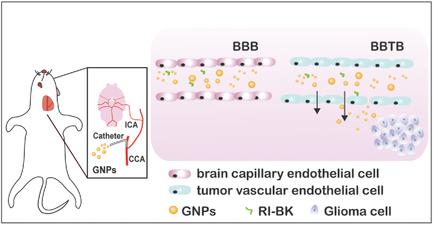Our official English website, www.x-mol.net, welcomes your feedback! (Note: you will need to create a separate account there.)
Effect of Retro‐Inverso Isomer of Bradykinin on Size‐Dependent Penetration of Blood–Brain Tumor Barrier
Small ( IF 13.3 ) Pub Date : 2018-01-02 , DOI: 10.1002/smll.201702331 Bingxia Su 1 , Ruifeng Wang 1 , Zuoxu Xie 1 , Huitong Ruan 1 , Jichen Li 1 , Cao Xie 1 , Weiyue Lu 1 , Jing Wang 1 , Dongli Wang 1 , Min Liu 1
Small ( IF 13.3 ) Pub Date : 2018-01-02 , DOI: 10.1002/smll.201702331 Bingxia Su 1 , Ruifeng Wang 1 , Zuoxu Xie 1 , Huitong Ruan 1 , Jichen Li 1 , Cao Xie 1 , Weiyue Lu 1 , Jing Wang 1 , Dongli Wang 1 , Min Liu 1
Affiliation

|
Retro‐inverso bradykinin (RI‐BK) has better metabolic stability and higher affinity for the BK type 2 (B2) receptor, compared with bradykinin. At low doses, RI‐BK can selectively enhance the permeability of the blood–brain tumor barrier (BBTB) without harming normal brain tissue. In this study, gold nanoparticles (GNPs) of size ranging from 5 to 90 nm are synthesized to assess the optimal size of nanocarriers that achieves maximum brain accumulation after the treatment of RI‐BK. The ability of the GNPs to cross the BBTB is tested in a rat C6 glioma tumor model. The results of inductively coupled plasma–mass spectrometry and transmission electron microscopy indicate that GNPs with size of 70 nm achieve maximum permeability to the glioma. The present study supports the conclusion that RI‐BK can enhance the permeability of BBTB and provides fundamental information for further development of nanomedicines or nanoprobes for glioma therapy.
中文翻译:

缓激肽逆反异构体对血脑肿瘤屏障大小依赖性渗透的影响
与缓激肽相比,逆转缓激肽(RI-BK)具有更好的代谢稳定性和对BK 2型(B2)受体的更高亲和力。在低剂量下,RI-BK可以选择性地增强血脑肿瘤屏障(BBTB)的渗透性,而不会损害正常的脑组织。在这项研究中,合成了大小为5至90 nm的金纳米颗粒(GNP),以评估在治疗RI-BK后可实现最大脑累积的纳米载体的最佳尺寸。在大鼠C6神经胶质瘤肿瘤模型中测试了GNP穿越BBTB的能力。电感耦合等离子体质谱和透射电子显微镜的结果表明,大小为70 nm的GNP达到了对神经胶质瘤的最大渗透率。
更新日期:2018-01-02
中文翻译:

缓激肽逆反异构体对血脑肿瘤屏障大小依赖性渗透的影响
与缓激肽相比,逆转缓激肽(RI-BK)具有更好的代谢稳定性和对BK 2型(B2)受体的更高亲和力。在低剂量下,RI-BK可以选择性地增强血脑肿瘤屏障(BBTB)的渗透性,而不会损害正常的脑组织。在这项研究中,合成了大小为5至90 nm的金纳米颗粒(GNP),以评估在治疗RI-BK后可实现最大脑累积的纳米载体的最佳尺寸。在大鼠C6神经胶质瘤肿瘤模型中测试了GNP穿越BBTB的能力。电感耦合等离子体质谱和透射电子显微镜的结果表明,大小为70 nm的GNP达到了对神经胶质瘤的最大渗透率。



























 京公网安备 11010802027423号
京公网安备 11010802027423号